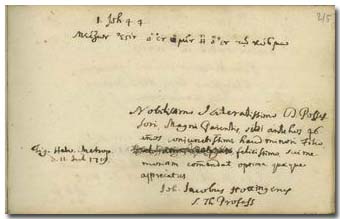
1. Joh. 4. 4.

Nobilissimo & Liberalissimo D. Possessori Magni Parentis sibi
ante hos 46. annos coniunctissimi haud minori Filio felicissimo,
sui memoriam commendat, optimi quaeque apprecatus.
Joh[annes] Jacobus Hottingerus
S. Th. Profess.
Tig[urini] Helv[etiae] Metrop[oli] d. 11. Jul. 1719.
|
* 1Jn 4:4: Vulgate: „quoniam maior est
qui in vobis est quam qui in mundo”.
|
|
|
Because greater is he that is in you, than he that is in the world.
1Jn 4,4. *
I recommend myself into the memory of the noble
and eminent owner [of this book], God-blessed and worthy son of
his great father – with whom I had been on close friendly terms 46
years ago –, and I wish him all the best.
Johann Jakob Hottinger, professor of theology
In the metropolis of Switzerland, Zürich, on
July 11, 1719
|
p.
215. Zürich, July 11, 1719
Hottinger, Johann Jakob
(1652-1735), Swiss theologian,
church historian
Johann Jakob Hottinger
was born on December 1, 1652 in an ancient civic family of Zürich,
a son of the orientalist ant theologian Johann Heinrich H. (1620-1667).
His brothers were the orientalist Johann Heinrich H. (1647-1692) and the physician Salomon H.
(1649-1713). He finished his theological studies in the Carolinum
of Zürich, then in 1672-74 in Basel. After this he wanted to go to
Marburg, but prevented from this by the French-German wars, he
went to Geneva. In 1676 he returned home, and was appointed a
pastor in Zürich. In 1680 he became a pastor in the nearby
Stallikon, and in 1686 diacon in the Grossmünster of Zürich. In
1698 he became a deacon, and was appointed professor of theology
at the university of Zürich, on the place of the late Johann
Heinrich Heidegger (1633-1698). He provided with great zeal for
all his offices. He wanted to continue the church history of his
tragically deceased father – who was drowned in the river Limmat
with his three children and his friend during a boat trip – and to
defend his father's honour and his catechism against the attacks.
For a while he continued the volumes of the Historia
ecclesiastica from the Tridentinum (1545-63), and then he
wrote his chef-d'oeuvre, the church history of Switzerland, in a
controversial and rough style, but with an admirable historical
knowledge. In 1719 Switzerland celebrated the bicentenary of the
Swiss reformation and the centenary of the Synod of Dordrecht, and
this gave a new impetus to the efforts at the unification of
Protestant confessions. Hottinger himself wrote a number of such
eirenic works, thus continuing the oeuvre of his professors,
Heidegger, Lucas Gernler
(1625-1675) and François Turrettini (1623-1687), the founders of
the Consensus helveticus of 1675. He believed that only the
Bible could be the foundation of teaching, and the differences of
opinions have to be accepted in all the other questions. He
affronted the rising pietism. He was a cheerful personality and a
clear lecturer. In 1729 he had a stroke, but slowly he recovered
and returned to his office. He died on December 18, 1735. Some of
his works:
Biblische Prob des zürcherischen Catechismi, Zürich, 1685. –
Helvetische Kirchen-Geschichten … Zürich, 1698, 1707,
1729. 4 Thle. – Dissertatio irenica de veritatis et charitatis
amicissimo in Ecclesia Protestantium connubio, quam praeside
Joh. Jacobo Hottingero … sustinebunt … Juxta exemplar
Tigurinum. Tübingen, 1721. – Pentas Dissertationum
Biblico-Chronologicarum, Utrecht, 1723.
After a reassuring Biblical quotation, Johann Jakob Hottinger
refers to his friendship made forty-six years ago with the father
of the owner of the album. Around 1673 Ferenc Pápai Páriz, Sen. (p.
447) had really been in Switzerland, where he made friendship
with a number of persons, among others with the Hottinger brothers who
were about the same age of him.
•
ADB • Jöcher • LivrGen IV 89 |

